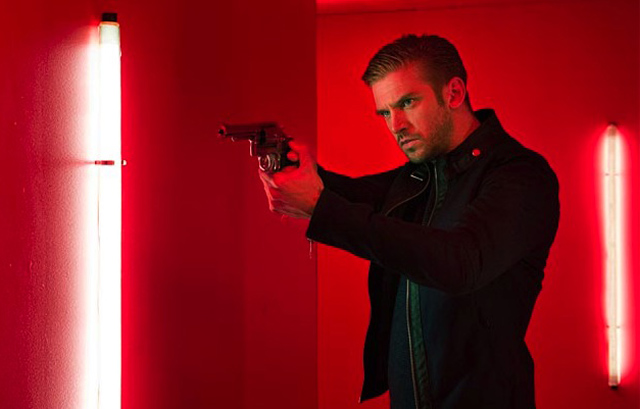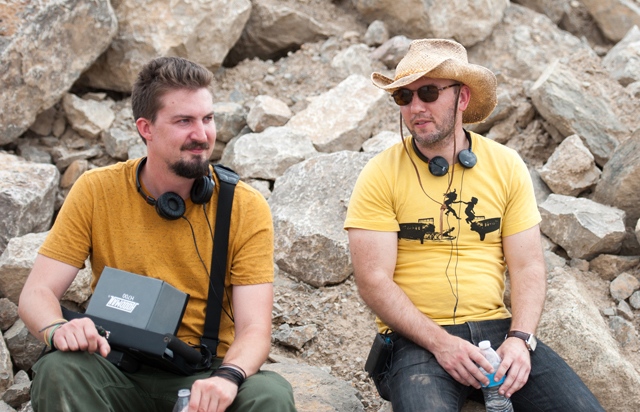CHICAGO – There is no better time to take in a stage play that is based in U.S. history, depicting the battle between fact and religion. The old theater chestnut – first mounted in 1955 – is “Inherit the Wind,” now at the Goodman Theatre, completing it’s short run through October 20th. For tickets and more information, click INHERIT.
Interview: Filmmaker Team Comes Together to Invite ‘The Guest’
CHICAGO – War is on the country’s mind once again, and in this week’s film releases, “The Guest” is coming to theaters. The main creative team behind it – lead actor Dan Stevens, screenwriter Simon Barrett and director Adam Wingard – weave a tale of a soldier that metaphorically reminds us that something is wrong.
Dan Stevens is a British actor, best known for portraying Matthew Crawley on the mega-popular “Downton Abbey.” His cool and collected returning soldier, the title character in the film, is effectively detached and present at the same. He will also be featured in the upcoming “A Walk Among the Tombstones.” The screenwriter/director team of Barrett and Wingard are horror story veterans, having contributed to segments in “V/H/S” and “V/H/S 2,” and having made the feature film scare, “You’re Next.” There is a maturity and reflection in “The Guest” that places it above normal scary movies, plus a purposeful tribute to the 1980s “Terminator” style of science fiction.

Dan Stevens Takes Aim in ‘The Guest’
Photo credit: Picturehouse
All three of the filmmaker participants sat down with HollywoodChicago.com, and spoke of the background iconography in the film, while still noting that what is within the story of “The Guest” is what makes the best statement about what the film is.
HollywoodChicago.com: Dan, how did you want to both honor the service of soldiers and show the character of David’s obvious backlash from the war?
Dan Stevens: As fantastical as this film is, we at least wanted to root it in at least one reality, in order to further explore the fantastical. One of the forms that has interested me – and this goes back to ancient texts like ‘The Iliad’ and ‘The Odyssey – was the very deep love that soldiers have for each other. If we are to believe David and the bond he has with Caleb, and since he goes to visit Caleb’s family because of this conditioning, he then can produce ways to assist them that are unorthodox.
One of the themes that excited me when I read the script – and what Simon was keen to explore – was in David going somewhere to help, but actually wreaking utter devastation. That can be applied to some global and political situations, and while we’re not making a direct comment on that. it certainly a backdrop.
Simon Barrett: Going somewhere to help and being perceived as the enemy is certainly a relevant thing right now. We didn’t want to overtly comment on that because none of us have served. But I did feel we were able to address it through the metaphor of a thriller movie. That was talked about at an early stage.
HollywoodChicago.com: Simon, what was the inspiration for the screenplay? How did you combine the peculiar post war energy of today’s veterans with the science fiction of the story?
Barrett: When I first conceived of the screenplay, it was back in 2007, while the Iraq War was still going on. There were a lot of films coming out of the industry that addressed the war, but mostly what they had to say was ‘this is bad.’ I was watching those films, and I thought a thriller would be interesting, but I didn’t know how to pull it off.
The idea of taking it into a science fiction direction came from a conversation with Adam about his love of ‘The Terminator.’ The tone of this type of 1980s style is when it clicked for me. Instead of having a veteran dealing with emotional issues, let’s have a guy with actual experimental conditioning, and it can serve as a metaphor for that stuff if you want it to, or it doesn’t have to if you’re not looking for it. If anything, you’re looking at a soldier who can shut down his emotions at will.

Director Adam Wingard, Screenwriter Simon Barrett On Set for ‘The Guest’
Photo credit: Picturehouse
HollywoodChicago.com: Adam, this is symbolic for so many issues having to do with the war – PTSD, veteran’s issues, even the gun fetish of some Americans. Besides the surface orientation of the story, what did you want to communicate about David’s plight and the plight of the family?
Adam Wingard: I don’t like to overly analyze things until they are completely over. You set up a lot of things, you know that they’re going to fall into place and you just have to trust that the subtext is there. As far as the plight of the family and David is very straightforward – it’s what you see on screen.
Stevens: From a cinematic point of view, though, it was a digestion and processing of the conflicts the film depicts. We’re all of a similar age, and we were all exposed to non-ironic glorification of a certain type of movie violence. There is as much of that in play as the direct depiction of actual confrontation.
Barrett: It’s different as to how the audience responds to David’s violence toward the high school bullies versus later in the film, when the violence takes on a much darker tone. Yet it’s the same character responding in the same way.
It was important that in addition, the family’s economic situation was shown. We knew we were making a fantastical situation, but there was also a father who didn’t have the best job – we wanted an accuracy there.
HollywoodChicago.com: Dan, as someone from Britain, you didn’t grow up with some of the American culture that was on display in ‘The Guest.’ Which element of the family and town life in the script particularly fascinated you, different from your culture or upbringing?
Stevens: We were exposed to the same things, just from a different angle. The American paradigm was everywhere in England, especially in the 1980s and ‘90s. It was the figure of the ‘High School Coach’ was a backdrop to my preparation for the film. His position as a patriarch is a curious phenomenon in America. Also, I’m learning about the U.S. state by state, and we shot near the desert in New Mexico. That was new to me, and I thrust myself into the landscape, both psychologically and visually.
HollywoodChicago.com: Simon, the government is interestingly and symbolically portrayed in ‘The Guest.’ It is said that technology always outpaces the killing aspect of war. What were you trying to say about that in regard to what David is?
Barrett: We were less interested in commenting on the government, than commenting on the government’s relationship to the corporations who are producing these defense systems. That relationship, between major defense corporations and the American government, is the bane of our existence now. The contractors seem to cause some of the tragedy.
Wingard: I’m fascinated with the classified nature of technology, we only find out about it much later. Whenever the government shows off something, like a new stealth aircraft, you’ve got to assume that the technology is completely out of date, or else why would they be showing it? The general American public, I think, is always 20 or 30 years behind the real technology of war.
HollywoodChicago.com: Adam, you use a Halloween ‘funhouse’ as a setting towards the end of the film. How were you going to use that judiciously, without just cheaply scaring people?
|
Dan Stevens, Simon Barrett & Adam Wingard of ‘The Guest’ Photo credit: Patrick McDonald for HollywoodChicago.com |
Wingard: The original ending of the script set the finale at the high school itself. But horribly unfortunate – but fortunate to the story – was the rash of spree shootings on campuses, so we couldn’t do anything like that in a high school. We had set up the time line for Halloween, but we didn’t have anything to tie it all together. That’s when the gears were shifted, and that’s where the Halloween funhouse concept came in.
I feel that ‘The Guest’ is Simon and I evolving away from straightforward horror. It was an opportunity to show we have a real knowledge and control over the horror elements, and we can look at it in a different perspective. In a way, the Halloween funhouse is a metaphor for the types of films we’ve made, it is a good time and not taking it too seriously. The whole thing is a fun ride, and we wanted to end it on that note.
HollywoodChicago.com: Despite all the research the three of you did regarding war and veterans, what do you think you or the average American citizen will never understand about a battlefront, and how does that affect our attitude toward starting conflicts again?
Barrett: That question is best asked to someone who has actually experienced the terror of the battlefield.
Wingard: We’ve had scares in our lives, maybe even a near death experience, but in my mind you have to amplify that by a thousand to even get close to a war type of terror. I’ve watched a lot of World War II DVDs, there is something that fascinates me about that battleground. At the same time, I’m very glad I’ll never experience that – hopefully – but there always is going to be an aspect of me that wonders what that overwhelming sense of war’s explosive madness is like.
 | By PATRICK McDONALD |


